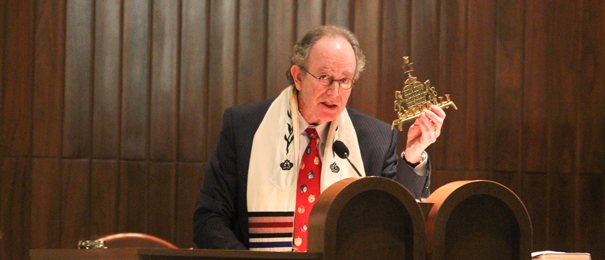Rabbi notes coincidence of Hanukkah, Christmas

By LINDA M. LINONIS
linonis@vindy.com
YOUNGSTOWN
This year, Hanukkah begins Christmas Eve. The first candle on the menorah will be lit at sundown Saturday.
In Christian churches, there will be candlelight services.
Rabbi Franklin Muller of Congregation Rodef Sholom said he sees the coincidence as an opportunity to share some calendar trivia and motivate people to think about the holiday’s significance.
In his “View from the Pulpit” column in the synagogue’s newsletter Star, he cited another coincidence that prompted fun and entrepreneurship when Hanukkah began Nov. 27, 2013, the eve of Thanksgiving.
The “menurkey” was created to celebrate the Festival of Lights. The rabbi pointed out that Hanukkah was early on the secular calendar.
This year, Hanukkah comes very late, he noted. It has begun Christmas Eve just three times since 1900 and occurred in 1902, 1940 and 1978. He posed the question: “Is it merely a coincidence that Hanukkah falls on Christmas Eve exactly every 38 years?”
Rabbi Muller said the Torah counts a generation as 40 years, and the timing could reflect the “genius of rabbis who devised the Jewish calendar.”
“Modified lunar” describes the Jewish calendar, which adds a month at various times. “This keeps the Jewish holidays in the right season,” Rabbi Muller said.
He noted in his column that once every decade, Hanukkah begins Christmas Eve, Christmas Day or the day after Christmas and continues into January. Hanukkah starting Dec. 25 has happened in 1910, 1921, 1959 and 2005 and Dec. 26 in 1929, 1948, 1967 and 1986.
All Jewish holidays begin the evening before the date specified on most calendars. This is because a Jewish “day” begins and ends at sunset, rather than at midnight. The reason for that is found in Genesis Chapter 1.
Rabbi Muller said Hanukkah and Christmas share the idea of being holidays of light. But the meaning behind each is different and distinct.
Hanukkah celebrates a miracle and religious freedom. Christmas marks the birth of the Christian savior, Jesus Christ, a miracle in itself.
Hanukkah recalls the story of the Maccabees, who were led by Judah Maccabee in defeating the Syrian Greeks in 161 BCE (before the common era). Judah led a small force to victory over a larger opponent and won religious freedom. When the Jews returned to the temple, it was in ruins. The Maccabees wanted to rededicate the temple but found only a small amount of oil for one day. The miracle was that the oil lasted eight days to light the lamps until it was replenished.
Congregation Rodef Sholom recently hosted a Hanukkah party. The rabbi said Hanukkah is a minor Jewish festival and is more a home-based observance than religious services at the temple.
The event included a brief service in which Rabbi Muller symbolically lit the candles on the menorah and members participated in a pot-luck dinner with latkes made by Rodef Sholom Brotherhood.
Gon and Shai Erez, Israeli shlichim (emissaries), led games and activities including a sofganiot (doughnut) eating contest, building a human menorah, finding hidden candles and matching candles to the menorah.
 43
43
